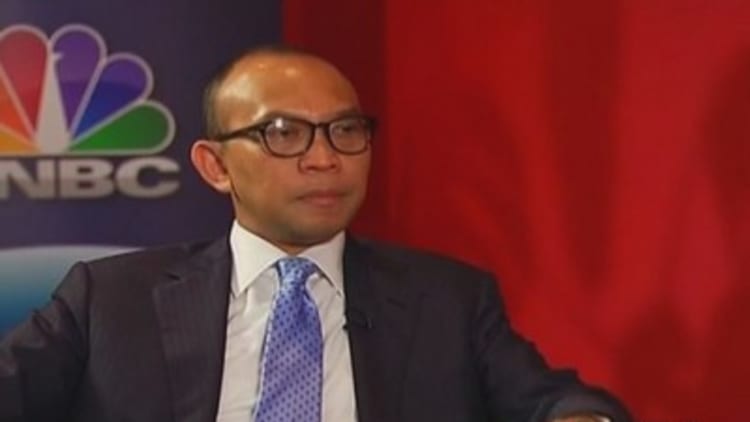
Indonesia, which was at the heart of the Federal-Reserve-induced taper-turmoil in emerging markets last year, is no longer part of the "Fragile Five" club, the country's finance minister said.
"We're no longer in the fragile five. Money is flowing back to Indonesia," Chatib Basri told CNBC on the sidelines of the Asian Development Bank's annual meeting in Kazakhstan.
Emerging markets Indonesia, India, Brazil, Turkey and South Africa had become known as the "Fragile Five" as their economies were seen as most vulnerable to the tapering of the U.S. central bank's $80-billion-a-month bond purchase program given their twin fiscal and current-account deficits, falling growth rates and above-target inflation.
Read MoreIndia and Indonesia: Not so bad after all?
However, concerns around these markets appear to have abated recently.
Basri cited the Indonesian government's $4 billion bond issuance in January -the biggest U.S. dollar bond sale in Asia since 1998 - as a sign of progress. The country issued $2 billion of debt due in 10 years to yield 5.95 percent and $2 billion of securities maturing in 30 years at 6.85 percent.
"If investors still believe this country will exist in another 30 years, then it means the confidence is still there," he said.
In addition to this, the rupiah - the world's worst performing currency last year - has staged a notable turnaround, climbing 5.5 against the U.S. dollar year to date.
Going forward, in order to avoid a similar rout in emerging markets, the Fed must ensure that it communicates its policy intentions clearly, Basri said.
"If you look at similarities between India, Turkey, South Africa, Indonesia, Brazil, we've got a problem either in the current account deficit or fiscal balance, so we need to get our house in order, I agree with that," he said.
"But once we get our house in order, it's very important to have this better communication because policy undertaken [has] an impact on the emerging markets," he added, noting that communication has improved over the past few months.
Growth outlook stable
Indonesia's economy, which grew at its slowest pace in four years in 2013, will maintain a similar pace of expansion this year, Basri said.
Read MoreWhy Indonesia's parliamentary elections matter
The nation posted gross domestic product (GDP) growth of 5.2 percent in the first quarter from the year-ago period, data on Monday showed, versus a 5.7 percent expansion in the fourth quarter and compared with a Reuters poll forecasting a rise of 5.6 percent.
The economy grew 5.8 percent in 2013, compared with annual growth of over 6 percent in 2010, 2011 and 2012.
"There is a slowdown on the investment side due to the tightening on monetary policy, but exports have started to pick up and private consumption has also started to pick up because of the effects of the election," he said.
Indonesia, which concluded legislative elections in April, is due to hold presidential elections in July.
Jakarta governor Joko Widodo, popularly known as Jokowi, is currently a front-runner in the presidential race. He is seen as a welcome change from the old elites that have dominated Indonesia's political landscape for many years.
Read MoreThis year thus far: Japan crumbles, Indonesia shines
"I don't want to comment on Jokowi personally but I want to take more on the general picture. People [focus] more on one person, but don't forget when you running a country it's also important to look at the team," Basri said.
Widodo's Democratic Party of Struggle, or PDI-P, however, had a weaker-than-expected showing in the parliamentary elections, which means it may need to form a coalition to be eligible to nominate him for president, given parliamentary and electoral threshold requirements.
Analysts say this could limit his ability to carry out for swift and sweeping reforms in Southeast Asia's largest economy.

